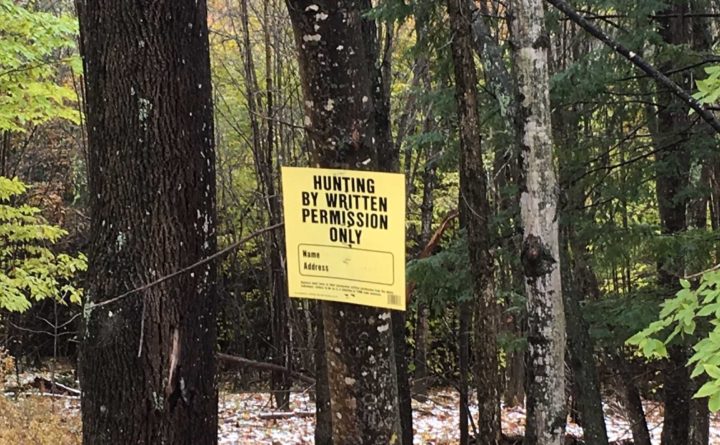
Today, let’s take a deep breath, appreciate what we have, and reflect on how quickly everything could change.
Perhaps we go out in the morning, walk into our back field for a bit of exercise, or to cut some wood, or to dig around for some gemstones that we know are waiting in that sandy pile of soil.
And perhaps we never come back.
That’s what happened to Karen Wrentzel , you know. On Oct. 28, 2017, the 34-year-old free spirit headed into the woods on her own land to dig around, as she loved to do.
A hunter, Robert Trundy, showed up a bit later. Thought she was a deer. Shot her dead.
On Tuesday, Trundy accepted a plea deal that calls for him to be sentenced to seven years, but he’s only expected to serve nine months in jail. The remainder of his sentence is suspended, meaning he only has to serve it if he violates his probation. He will be on probation for four years once he is released from prison.
There’s plenty we could say about that deal, or about the fact that Trundy reportedly could not force himself to walk all the way to Wrentzel and try to help, even after he shot her, and after he heard her scream.
Over the past two years, I’ve spent a bit of time around Wrentzel’s family as the case made its way through the system.
I have sat in her grandmother’s Hebron home with friends and relatives, listening as they told stories about the person they loved, and lost.
I’ve spoken in hushed tones with these same grieving people outside a courtroom, where they’ve tried to explain the unexplainable: their feelings of loss and grief, and the dawning realization that things will never be the same.
And for the past two years, I’ve wondered how things could have turned out differently.
“Karen Wrentzel did nothing wrong,” Superior Court Justice Andrew Horton told the courtroom crowd on Tuesday. “She was on her own property … she did nothing wrong.”
Still, she’s dead.
We Mainers — especially those of us who love to hunt — have long been proud of an outdoor tradition that has made access to the land of others the status quo. Even without their permission. Especially without their permission.
For years, Maine has been governed by a custom, if not a specific law, that allows hunters and other recreationists to use land that they do not own, so long as that land is not posted, or so long as the landowner does not otherwise prohibit the practice.
And for years, I’ve confidently supported that custom.
Today, sadly, I’m not so steadfast in that support. I still love the unfettered access to vast tracts owned by forest products companies. But closer to home, I’m not likely to step onto land where I’ve not been officially granted permission to hunt.
It’s cases like Karen Wrentzel’s that have made me think seriously about the issue and what could be changed.
Jon Spofford is Wrentzel’s uncle. He lives a couple hundred yards up the hill from where Karen died, on a piece of family land that’s now his. His mom, Beverly, lives just downhill. Karen’s parcel is adjacent to that.
Altogether, more than 45 acres is owned by the family. It’s in the middle of rural Oxford County, with farms nearby, and woods full of deer … and deer hunters.
Camouflage, Jon Spofford will tell you, is nearly the town uniform.
“At no time since 1995 had my mother been asked or informed of anyone hunting on her property. Nor have I, since 2001. Nor had my neighbors, since I believe 2008,” Jon Spofford said Tuesday. “Had [Trundy] had the courtesy of stopping by to inform us landowners of his intentions [to hunt], Karen would likely still be alive.”
Wrentzel, her family says, did not know anyone else would be on her land. She was a non-hunter. She didn’t even know that hunting season began on the day she made her last trek into the woods.
And as Justice Horton will tell you, that’s not a crime.
“Karen Wrentzel did nothing wrong,” he said.
Remember that.
Over the coming days, I’m sure plenty of readers will share their thoughts about this column and debate the relative merits of making changes to what many Mainers view as an untouchable land access policy: If you don’t want people on your land, post it.
And then Karen Wrentzel dies. Or Megan Ripley, back in 2006. Or Karen Wood, back in 1988.
None did anything wrong. All are equally dead.
There is another option, you know. And in court on Tuesday, the judge was even willing to utter the alternative aloud.
That, in my book, makes him braver than most.
“Perhaps the law should require a hunter to get permission of a landowner before going onto a property,” Horton said.
Talk with enough grieving relatives, listen to enough stories about the way things will never be, and you might find yourself wondering the same thing, as I am now.
Perhaps it should.
Your thoughts are welcome.
John Holyoke can be reached at jholyoke@bangordailynews.com or 207-990-8214. Follow him on Twitter, @JohnHolyoke. His first book, “Evergreens,” will be released by Islandport Press in October.
This article originally appeared on www.bangordailynews.com.




